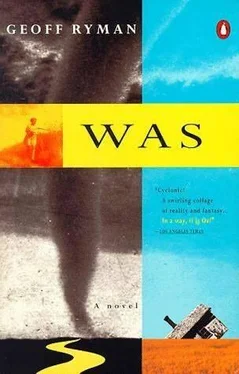"My little baby," said Mortimer in a greasy, singsong voice. "He's rigid with embarrassment. You might say Mort'ified. Shall we play a nice little game?"
"Eeek," said Karl in a tiny voice. There was an appreciative murmur of laughter. Laugh at me, will you? Mortimer thought. Laugh? Then listen to this.
And Mortimer threw himself from side to side in the chair, possessed by laughter, shrieking with it, loud and piercing as a knife.
"Ooooooooo!" breathed out the audience in fear. It was the laugh of the Wicked Witch of the West.
Later that night, Karl came and drank whisky in Jonathan's room, and slept with him, even though, as far as Jonathan could determine, he was heterosexual. Karl's last name was Rodriguez. Karl Rodriguez. Jonathan kept saying the name. Could you fancy someone for their teeth? Karl had a huge grin full of large bright teeth. Karl's parents had come to the north from Mexico.
The next day, Jonathan was interviewed in front of five hundred people. He sat behind a folding table, next to a scholarly looking woman with plain, pulled-back hair and glasses.
"What's your worst nightmare?" she asked.
"Waking up to find I'm in Child Minder Fifteen ." There was laughter. The laughter was uneasy.
"Do you sometimes find the violence hard to take?" the interviewer asked.
"Oh no. I can't see all that meat and blood," said Jonathan. "I can't see red. I'm color-blind."
And he thought: I've got, I've got to find something else to do.
There was to be a charity performance of The Wizard of Oz in the Hollywood Bowl. Dorothy was going to be played by Cher. Nick Nolte was the Tin Man. Sam Shepard was going to play the Scarecrow, but had to pull out.
For the first time in his life, Jonathan hustled. Ambition alone could not have made him do it. Only an overwhelming urge to play the part could have driven him.
He went straight from reading Variety to Aaron Spelling's office. Aaron was producing; Jonathan had appeared in "Dynasty," another one of his tormented character roles, a priest in love with Joan Collins. The character had not been popular with audiences and was speedily dropped-but Spelling still had some time for Jonathan.
Jonathan simply told him the truth. He was the only man in L.A. who could still play the Scarecrow. To prove it, he sang "If I Only Had a Brain" right in the office. He ran full speed at the wall and did a backward somersault from it. Jonathan shook his head like a salt-shaker and knew that he was sprinkling from it something he could only name but not describe. The something was Ozziness, the quality of Oz.
Spelling chuckled and shook his head. "Okay, okay, you sold me." Maybe he needed to fill the part quickly, maybe it didn't matter with all the star names on the bill. There were a lot of maybes.
But word soon went around town that some horror-movie star was playing the Scarecrow. The buzz was that the horror-movie star was wonderful.
"Well, he's always been a brilliant actor," said those who cared to remember the little theaters, his TV psychos, his TV academics.
Jonathan found himself having lunch with Cher. She seemed to take a kind of rueful, maternal interest in him. He told her about his researches into Baum, into Kansas, into Oz. He told her about his visit to Lancaster, California. She changed the subject.
"This show could do you a lot of good," she said. "This show could really break you."
Jonathan was dazzled. Something alive seemed to stir in him, made out of joy. With a kind of twist and a flip of his hands, he folded, out of the corner of the tablecloth, a dog's head. It had little knots for ears, a snout, and a punched-in, toothless mouth.
"We're not in Kansas anymore," said Jonathan, stroking the dog's head. The dog turned around and looked at Cher and cocked its head with curiosity. Its ears rose up, attentive. The dog was alive.
"That's terrific," said Cher.
"I only wish I would stop losing all this weight," Jonathan said to Toto.
A week or two later, he went in for tests.
Ira didn't show up. Jonathan hated driving now, but he drove to Bill's house by himself anyway, alone in the dark, and got horribly lost. He missed the exchange onto the freeway, and he missed the turn off the freeway, and then he wandered aimlessly up and down Topanga Canyon. The roads on the map wriggled under his eyes like worms.
He arrived in a panic, sick at being lost and alone, horrified at how fragile his illness had made him.
"I drove round and round for hours! I couldn't find where I was!" He was sobbing. He had to sit down.
"Muffy, get a whisky, could you?" asked Bill.
Bill took Jonathan in his arms. It was a great comfort to be held. But it was an enfeebling comfort. Jonathan had been reduced to needing to be hugged after a simple drive in the car. Jonathan wiped his cheeks and tried to pull away, patting Bill on his great bare arms.
"There you go, buddy," said Bill, and let him go.
And Bill's wife Muffy was there, holding out a glass of whisky. A glass of whisky in Waterford crystal. Jonathan was terrified he might drop it.
"You must think I'm a real wimp," he said.
"I think you're scared," said Muffy. "It's not pleasant, being alone and lost."
It was alarming how people were the only island of safety he had against terror. As soon as he was around people, the fear went. Most of the time in L.A., he was alone.
"I couldn't read the map," he said, gulping whisky and snot.
"Let me show you around the house," said Bill.
The house was a museum. It was a great old farmhouse from the days when L.A. was a Western settlement of farmers and fruit trees. There were huge wooden spoons on the wall that had been used for stirring vats of lye soap. There were old homemade candles. There were shoes people had made themselves out of hides. There were family Bibles, with names of parents and grandparents.
"Look at this! Look at this!" Jonathan exclaimed. "I didn't know you were into all of this!"
How can you cover so many bases? Jonathan thought, looking at Bill Davison's face. You can talk shop to a ball player, history to a historian. With a face like yours, you ought to be some Reaganite businessman in favor of defense budgets. With money like you make, you ought to be slick and sharp and spouting horrible, phony relation-speak.
"All these things," said Bill Davison. "They're from Kansas. I kind of collect them."
"I only take photographs," said Jonathan.
Muffy walked with them, commenting quietly on the implements. "That object there is for firing pills down horses' throats." There was something European about her. She was plump and pale, with undyed hair, no makeup, and yet there was something forcefully sensual about her. Even Jonathan felt it. Her breasts hung loose, her hips wobbled under the peasant dress. Jonathan found that he was glad for Bill, glad that he had a wife who was his match.
Muffy had gone with Bill on his expeditions to Kansas. She talked about the samplers on the walls. She knew about the people who had made them. One of them had been singed in the fire at Lawrence. Made by Millie Branscomb, aged eight.
"This is the strangest thing," Muffy said. "When we researched this, we found out it was done by the mother of someone Bill knew."
"The mother of a patient of mine. My first patient, you might say," said Bill. "It's all very strange. I got to know a woman about eighty-something. She was living in a Home. She thought she was Dorothy Gale."
It took a moment. "From Oz," said Jonathan.
"Turned out," said Bill, "that she was. She knew Frank Baum."
There was that icy vapor again, from the snow, from the cold. It rose up from the floorboards. Jonathan saw it at his feet.
Later, when Muffy was in the kitchen, they sat at the table and Jonathan said, "I'm having visions, Bill."
Читать дальше












